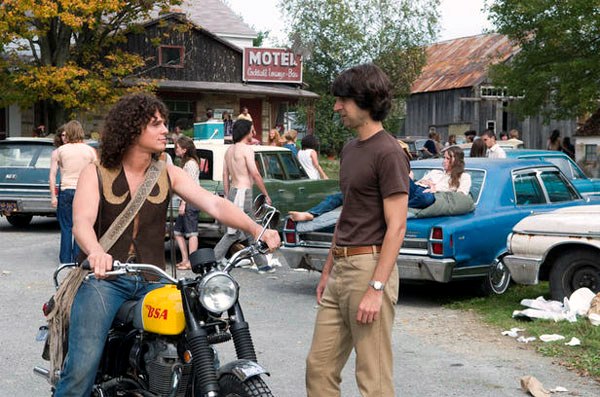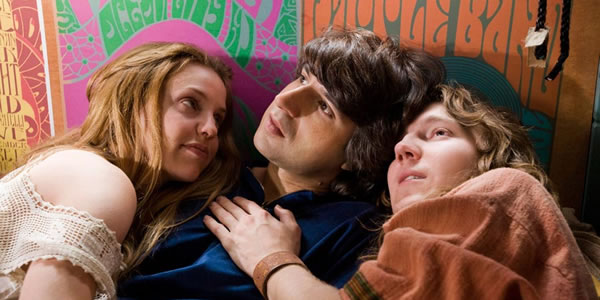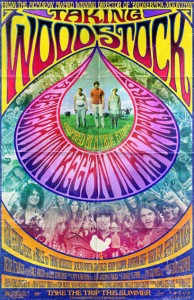
It is less entertaining than it sounds after you are done getting the general facts. According to the historical docudrama Taking Woodstock, three days of peace and music circa 1969 was preceded by uproar by community members who believed the concert would prompt dangerous riots. Organizers attempted to calm those fears by saying there wouldn’t be more than 50,000 in attendance. By the end of the first day, the city of White Lake was declared by the New York State Governor as a disaster zone as an estimated 450,000 showed up for what became a free concert. Uptight townspeople protested on street corners to kick the hippies out by decrying a national emergency. Brighter townspeople decided to cash in on the proceeds.
Less hippies, more straight-arrows. The flower children, the musicians, and heck, the concert itself takes a backseat as the film centers on the life of Elliot Tiber (Demetri Martin), a square but sensible Jewish boy who as looking for a way to save his parent’s encumbering motel business. As the President of the Bethel Chamber of Commerce, Tiber is responsible for issuing a permit for Woodstock coordinators. Elliot’s neurotic and stingy parents (played by Henry Goodman and Imelda Staunton) are prevalent characters that transform from doubters to entrepreneurs as they quickly adapt to the Woodstock cash cow.
What will dawn on the unsuspecting audience is that “Taking Woodstock” is about the behind the scenes footnotes – the business behind the greatest concert ever put on. We learn about the venue limitations, the firestorm protests, the media criticism, the overcrowding, and so on. As a result, we never really as an audience get into Woodstock. It really is about the activities going on outside of Woodstock. In what feels like a narrative prank, Elliot makes consecutive attempts each day to get into Woodstock but he always gets held at the outside perimeter – when we do get a peek into the music concert through Elliot’s eyes it is entirely through acid trip distortion.
For the most part Elliot, along with us, gets immersed into the typical milieu of mudslides, the paraphernalia traded in the back of parked vans, and the Port-o-Potties. The film sees this all as nostalgia, of course, (it’s like saying that even the parts of the festival that were a drag were still, you know, fun man!) but how about giving us a taste of the best of Woodstock? The movie gets soft and squishy with concern with how our hero will “grow” out from his parent’s shadow.
So really, if you expect to see Jefferson Airplane, The Grateful Dead, Jimi Hendrix and Janis Joplin you’re better to stay home and rent the 1970 seminal documentary “Woodstock” which contained them and much, much more. This Ang Lee film probably has more original orchestral music by Danny Elfman than there contains seminal music from the era, so that’s a shame.
Despite the use of such novelties as the split-screen device (with overlay of images that feels oddly out of rhythm), the correct mood and attitude of this material often feels misplaced. Perhaps Lee (“Brokeback Mountain,” “Crouching Tiger, Hidden Dragon”) is the wrong director to take on Woodstock. His style too mannered and polite.
Lee decided he wanted to make this film out of interest in making a comedy which would be a detour from his recent heavy dramatic work. Yet his film simply isn’t rowdy enough. Lee doesn’t totally taper away from us in what we expect to see: Naked flower children, frolicking in the woods, skinning dipping in the lake, getting high and singing along in the name of peace and freedom. But even in the face of debauchery the film isn’t rowdy enough, it’s as if Lee wants to only get close up and personal with, well, non-hippies. Lee’s biggest misstep however is that he seems to have forgotten the peace and music. The film is primarily preoccupied with traffic jams and trash pile-ups – how White Lake got hailed as a disaster zone.
120 Minutes. Rated R.
HISTORICAL DRAMA / MUSIC LOVIN’ / SUNDAY AFTERNOON COUCH MOVIE
Film Cousins: “Woodstock” (1970); “Running on Empty” (1988); “Flirting with Disaster” (1996); “Together” (2000, Sweden”).






